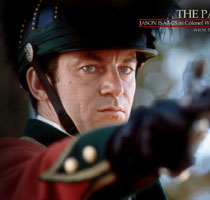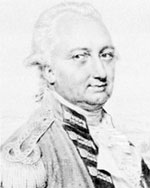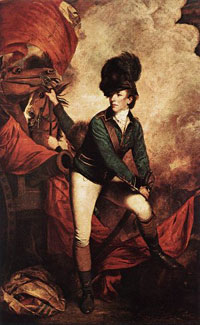The Patriot《爱国者》(视频精讲之五)(在线收听)
影片对白
 MAJOR HALBERT: My lord, there is a rider at the gates. A civilian carrying a white flag.
MAJOR HALBERT: My lord, there is a rider at the gates. A civilian carrying a white flag.
CORNWALLIS: I'm occupied .
MAJOR HALBERT: He has a pair of dogs with him. Great Danes.
CORNWALLIS: Now we come to the matter of the specific targeting of officers during engagements. Of course you must know that in civilized warfare, officers in the field must not be accorded inappropriate levels of hostile attention.
MARTIN: To your mind , what are appropriate levels of hostile attention?
CORNWALLIS: Colonel, imagine the utter chaos that would follow from leaderless armies having at each other. There must be gentlemen in command to lead and, and, and when appropriate, restrain their men.
MARTIN: Restrain them from, say, targeting civilians. Women, children and such?
CORNWALLIS: That's a separate issue.
MARTIN: No, no, no, I consider them linked. As long as your soldiers attack civilians, I will order the shooting of your officers at every engagement. And my men are excellent marksmen.
CORNWALLIS: Very well, now let us move on to...
MARTIN: Prisoner exchange.
CORNWALLIS: Sir?
MARTIN: You have eighteen of my men. I want them back.
CORNWALLIS: I, I do have eighteen criminals under sentence of death, but I, I hold no prisoners of war.
MARTIN: If that's your position, then eighteen of your officers will have to die. Nineteen, if you hang me with my men.
CORNWALLIS: My officers?
MARTIN: Sir, top of the ridge, to your left. Just Below the tree line.
CORNWALLIS: Their names and ranks?
MARTIN: They refused to give me their names. But their ranks are nine lieutenants, five captains, three majors and one very fat colonel who called me a cheeky fellow.
CORNWALLIS: You know this is not the conduct of a gentleman.
MARTIN: If the conduct of your officers is the measure of a gentleman, I take that as a compliment. Get my men.
CORNWALLIS: Arrange the exchange.
MAJOR HALBERT: My lord.
MARTIN: Thank you sir.
MAJOR HALBERT: One of our captured officers, my lord.
CORNWALLIS: My reputation suffers because of your incompetence! That man insults me!
TAVINGTON: Quite impressive for a farmer with a pitchfork, wouldn't you say?
CORNWALLIS: I want you to find that man. I want you to capture him.
TAVINGTON: The man has the loyalty of the people. They protect him. Protect his family. Protect the families of his men. I can capture him for you. But to do so requires the use of tactics that are somewhat… what was the word your lordship used? "Brutal", I think.
CORNWALLIS: Go on.
TAVINGTON: I am preparing to do what is necessary. I alone will assume the full mantle of responsibility for my actions free of the chain of command rendering you blameless. However, if I do this, you and I both know that I can never return to England with honor. What, I wonder, is to become of me?
CORNWALLIS: When this war is over here in the colonies, the new aristocracy will be landowners.
TAVINGTON: Tell me about Ohio.
PRIVATE: Make way .
TAVINGTON: As you were. Wilkins. A plantation seven miles from Wakefield, on the Santee, east of Black Swamp. Who lived there?
WILKINS: Benjamin Martin.
BORDON: He is the ghost.
TAVINGTON: What do you know about him?
WILKINS: Hell , everything. I could tell you the size of his boot.
妙语佳句,活学活用
1. Occupied
Occupied 这个词有很多有趣的用法,我们来一一看一下。作为形容词,occupied可以表示:
1)被使用的,例如:She keeps her time well occupied. The WC is occupied.
2)被占领的,例如:the occupied countries of Europe
3)有人居住的,例如:Not all the occupied (or tenanted) apartments were well kept up.
4)投入精力/集中注意力做……事,例如:She keeps herself fully occupied with volunteer activities.
在片段中的这个occupied 意思是“正被某事占据”,可以译为“我正忙着呢”。
2. To one's mind
和 in one's opinion 同义,例如:To my mind we have enough money to start building now.
3. Become of
“Happen to, befall, be the fate of 使遭遇,发生于,变成”的意思,例如:I haven't seen Joe in a year; what has become of his book?
4. Make way
意思是“让路”,例如:Make way for the king!
Make way 还表示“给别人让位”,例如:He resigned to make way for a younger man.
此外,make way 还表示“发展,进步”,如:Is this enterprise making way?
Please make way for the wheelchair.
5. Hell
Hell 在这里是个语气词,用来加强语气,如:“Hell no!”。Hell也可以用来表示惊讶,愤怒,厌恶等感情。
文化面面观
人物:Charles Cornwallis & William Tavington (Banastre Tarleton)
1. Charles Cornwallis, 1st Marquess, 1738-1805, English general and statesman.
 He was commissioned an ensign in the British army in 1756 and saw service in Europe in the Seven Years War. As a member of Parliament (which he entered in 1760), he opposed the tax measures that helped bring on the American Revolution. When the war came, however, he placed himself at the king's service and was sent (1776) to America. He served under Gen. William Howe at the battle of Long Island, in the New Jersey campaigns, and at the battle of Brandywine, acquitting himself with credit in all the engagements. In 1778, Cornwallis became second in command to Sir Henry Clinton, British commander in America. Two years later Cornwallis began the fateful Carolina campaign, which led directly to the Yorktown campaign and the major British defeat that in 1781 ended the fighting. Cornwallis was not held responsible for the disaster and in 1786 became governor-general of India. There he reformed the civil service and the judiciary and distinguished himself in the campaigns against Tippoo Sahib of Mysore. He was created a marquess in 1792 and returned to England in 1794. In 1798, Cornwallis was sent to Ireland as viceroy and commander in chief, and he was stern in repressing the rebellion there in the same year. He worked to achieve the Act of Union (1800), which initiated the unhappy experiment of uniting the Irish and British parliaments, but he resigned (1801) with William Pitt when George III refused to accept Catholic Emancipation. Cornwallis was then commissioned British minister plenipotentiary and helped to draw up the Treaty of Amiens (1802), which temporarily halted the war with Napoleonic France. In 1805 he was again appointed governor-general of India, but he died two months after his arrival there.
He was commissioned an ensign in the British army in 1756 and saw service in Europe in the Seven Years War. As a member of Parliament (which he entered in 1760), he opposed the tax measures that helped bring on the American Revolution. When the war came, however, he placed himself at the king's service and was sent (1776) to America. He served under Gen. William Howe at the battle of Long Island, in the New Jersey campaigns, and at the battle of Brandywine, acquitting himself with credit in all the engagements. In 1778, Cornwallis became second in command to Sir Henry Clinton, British commander in America. Two years later Cornwallis began the fateful Carolina campaign, which led directly to the Yorktown campaign and the major British defeat that in 1781 ended the fighting. Cornwallis was not held responsible for the disaster and in 1786 became governor-general of India. There he reformed the civil service and the judiciary and distinguished himself in the campaigns against Tippoo Sahib of Mysore. He was created a marquess in 1792 and returned to England in 1794. In 1798, Cornwallis was sent to Ireland as viceroy and commander in chief, and he was stern in repressing the rebellion there in the same year. He worked to achieve the Act of Union (1800), which initiated the unhappy experiment of uniting the Irish and British parliaments, but he resigned (1801) with William Pitt when George III refused to accept Catholic Emancipation. Cornwallis was then commissioned British minister plenipotentiary and helped to draw up the Treaty of Amiens (1802), which temporarily halted the war with Napoleonic France. In 1805 he was again appointed governor-general of India, but he died two months after his arrival there.
2. William Tavington
Colonel William Tavington is based on Lt. Colonel Banastre Tarleton.
 |
|
Lieutenant-Colonel Banastre Tarleton by Sir Joshua Reynolds |
Banastre Tarleton was the son of a wealthy Liverpool merchant, a sometime mayor of the city. After attending Oxford, young Tarleton entered the King's Dragoon Guards in 1775. He volunteered for service in the American colonies and gained his first military experience in Henry Clinton's unsuccessful venture against Charleston, S.C., in June 1776. Tarleton participated in the New York, Philadelphia, and Monmouth campaigns and was a member of the small party that captured American general Charles Lee in late 1776.
Accompanying Clinton on his second expedition against Charleston in 1780, Tarleton demonstrated his ability as commander of light infantry and dragoons. In a number of engagements he sometimes annihilated the opposition at little loss to his own men. After the bloody battle at Waxhaws, S.C., in May, Tarleton was regarded by the Revolutionaries as bloodthirsty and merciless. His reputation was largely a consequence of his tactics - usually a rapid cavalry charge followed by the energetic use of sabers and bayonets - and their impact upon the often poorly trained Americans.
Tarleton helped rout Horatio Gates's army at Camden, S.C., in August 1780 and surprised and destroyed the mixed forces of Thomas Sumter at Fishing Creek. Tarleton's defeat at Cowpens, S.C., in January 1781 materially weakened British forces in the South and raised rebel morale and encouraged resistance to the British. Subsequently, he won minor engagements and led a spectacular raid deep into Virginia in July. But, as he admitted, the results of this raid did not compensate for the loss of men and horses. He served with Lord Cornwallis in the Yorktown campaign, and their forces surrendered in October.
After being paroled, Tarleton returned to England in 1782. He served (with one year's exception) as a Liverpool member of the House of Commons from 1790 to 1812. Sometimes active in the army, he advanced gradually to become full general in 1812. He received a baronetcy in 1815.
Tarleton was involved with the actress Mary Robinson, former mistress of the Prince of Wales (the future George IV), for many years. He later married an illegitimate daughter of the Duke of Ancaster. Tarleton died on Jan. 25, 1833, in Leintwardine, Shropshire.
A historian of the American Revolution wrote of Tarleton: "As a leader of cavalry, he was unmatched on either side for alertness and rapidity of movement, dash, daring and vigor of attack."
Tarleton never had a face-to-face with any of the militia leaders as he does with Martin in the movie.
考考你
用今日所学将下面的句子译成英语。
1. 婚姻失败后,她对事业投入了全部精力。
2. 他会变成什么样呢?
3. 他该退休、为年轻的教授让位了。
The Patriot《爱国者》(精讲之四)考考你 参考答案
Dan Scott, barely a week ago I heard you railed for two hours about independence. Mr. Hardwick, how many times have I heard you speak of freedom at my father's table? Half the men in this church, including you, Father, and you, Reverend, are as ardent patriots as I. Will you know, when you are needed most, stop at only words? Is that the sort of men you are? I ask only that you act upon the beliefs of which you have so strongly spoken and in which you so strongly believe.
丹·斯科特,仅仅一个星期以前,我还听到你慷慨激昂地谈论了两个小时独立。海德威克先生,你在我父亲的餐桌上发表过多少关于自由的论调了?这个教堂里有一半的人,包括你,父亲,还有你,牧师,都和我一样是满腔热情的爱国者。当国家最需要你们的时候,你们就只是说说算了吗?你们就是这样的人吗?我只是请求你们,按照你们曾经积极提倡过的坚定信仰来行动。